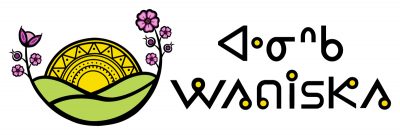The waniska Centre: Strengthening land- and culture-based research

The waniska Indigenous Centre for HIV, hepatitis C (HCV) and sexually transmitted blood-borne illness (STBBI), funded by the Canadian Institutes of Health Research and based at the University of Saskatchewan, is going to undertake research in a new way. It will engage Indigenous communities and people in research that is focused on Indigenous knowledge and the land to develop, explore and scale up promising and wise practices using both an Indigenous and Western lens.
Our approach to working with Indigenous communities and people
The name waniska is a Cree word which means to wake up or arise. The waniska Centre is an action-oriented centre that will learn from the best HIV, hepatitis C and STBBI studies and programs to build unique studies and programs using etuaptmumk, a Two-eyed Seeing approach which brings together the best of Indigenous and Western perspectives and sciences. Working with Indigenous communities and academics, both Indigenous and allied across Saskatchewan and Manitoba, we’ll learn about existing research and programs that are benefitting Indigenous people. The waniska Centre will co-develop additional programs and research projects that provide support in meaningful ways, combining ancestral knowledge with modern science.
We will work with communities and academics, and train the next generation of Indigenous scholars, practitioners and community members in HIV/HCV/STBBI research. Land- and culture-based solutions-focused research will create innovative practices, leading to health system transformation and improved health outcomes.
Localizing the research
A lot of important research has been done globally on HIV, hepatitis C and STBBIs, but much of it has been led by non-Indigenous researchers. We have Indigenous staff who will work with Indigenous communities and people to identify how to take those research findings, contextualize them in meaningful ways and appropriately scale up or deepen the projects. Too often, research findings are not implemented or followed up with relevant strategies to address prevention, screening, diagnosis, treatment, care and social supports; we’ll work with our partners to find innovative, strengths- and community-based strategies that put the results into action.
The waniska Centre also wants to build its own capacity to conduct research through partnerships with Indigenous and non-Indigenous experts in the field of Indigenous health and HIV/HCV/STBBI research. Indigenous insight and methods have already been reflected in the framework of certain research, such as the HIV/AIDS medicine wheel, created in 1992 by Leonard Johnston and Frederick Haineault after consultation with Elders in Alberta. The waniska Centre aims to be a home for Indigenous knowledges, to cultivate Indigenous land- and culture-based research and HIV, hepatitis C and STBBI interventions.
Land- and culture-based healing
Land- and culture-based healing is a strong focus for the waniska Centre and its partner organizations and communities. Land connects Indigenous people with Mother Earth, our ceremonial space, ceremony, Indigenous languages and the wisdom of our ancestors. For Indigenous people, HIV, hepatitis C and other STBBI cannot be addressed without land and culture, for they are fundamental to our health and wellness. We will collaborate with Indigenous groups and communities on land-based healing led by Elders and Knowledge Holders to support people’s spiritual, mental and emotional health, which in turn will improve their physical health and the overall health of their communities. We will also support mainstream healthcare organizations understand how to best operationalize cultural safety.
Gender re-awakening
At the waniska Centre, we believe that gender re-awakening and healing are essential for the health and wellness of Indigenous people and community. Indigenous world views, health and wellness have been detrimentally impacted by colonialist perspectives about gender. Women and men were forced into binary, European roles, and Two Spirit people were shamed and forced to abandon their traditional roles in their communities. The imbalance in traditional gender roles disrupted the health and wellness of many people, and contributed to inequities in substance use, HIV, hepatitis C and other STBBIs and health problems impacting Indigenous people today. We will honour people of all genders and work with them using stigma-free, harm reduction, and culturally safe and responsive approaches.
Traditional approaches to new relationships
The waniska Centre is approaching its relationships with communities and organizations in a good way. In April 2021, it held two pipe ceremonies to celebrate and honour the connections it has with two Indigenous-led health centres: All Nations Hope Network in Saskatchewan and Ka Ni Kanichihk in Manitoba. Pipe ceremonies provide protection for those involved, a path forward and ethical guidance from ancestors. They bring life and direction to agreements and act as the spiritual foundation. During the ceremonies, the pipe carriers sought ancestral guidance for the waniska Centre and its partners to innovate new approaches to undertaking community-led and Indigenous-resonant ethical health research. For the waniska Centre, this includes incorporating Indigenous ways of knowing, being and doing into research processes and practices rather than relying on standard procedures such as memoranda of understanding and other written agreements. The pipe ceremonies are a way in which we, as Indigenous and allied researchers working in a Western institution, and the university itself, can decolonize our processes and put reconciliation into action.
Going forward
The waniska Centre launched on June 21, National Indigenous Peoples Day, featuring a number of Indigenous speakers, ceremonialists and performers. This celebration reflected the good work that is to come as we partner with community, academics and others to address HIV, hepatitis C and STBBIs in Indigenous communities in a good way.
Sarah MacDonald is the communications officer for both the waniska Centre and the Indigenous Wellness Research Group at the University of Saskatchewan.
Rebecca Zagozewski is the research manager at the waniska Centre at the University of Saskatchewan.
Dr. Alexandra King (Nipissing First Nation) is the Cameco Chair of Indigenous Health and Wellness at the University of Saskatchewan.
